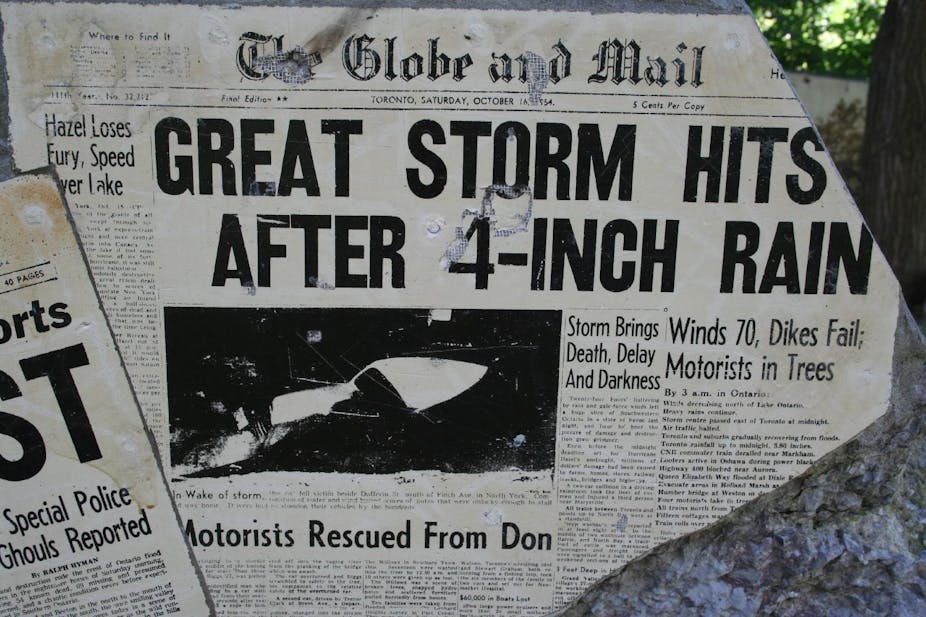How does newspaper coverage affect how we view climate change? A new report has estimated that 82% of articles about climate change are framed in the context of “disaster” and “uncertainty”.
The report’s lead author, James Painter, notes that those dominant media frames may be doing us a disservice because the public “finds uncertainty difficult to understand and confuses it with ignorance.” Likewise, “disaster messages can be a turnoff,” and the report therefore suggests that a better framing might involve the language of risk. This, they suggest, would encourage focus on the trade-off between the risk - and cost - of inaction, and of climate mitigation.
The media’s role in shaping public perception, for better or worse, is known to be substantial. Likewise, the importance of finding a proper frame for the communication of climate science is well established.
It is therefore important to examine not only the psychological impact of the frames identified by Painter and colleagues, but also how they lend themselves to be distorted by people who, usually for ideological or political reasons, deny the fact that the globe is warming due to greenhouse gas emissions.
Disaster
It is not entirely surprising that the primary focus of reporting on climate change is framed within the context of “disaster.” After all, the frequency of weather and climate-related disasters has nearly tripled over the last 30 years.
Recent research in the UK and in the US has shown that unsurprisingly, experiencing disasters first-hand is linked to acceptance of climate change. This, in turn, leads to a willingness to contribute to mitigation policies.
And even when disasters are not witnessed first-hand, there is evidence that the public memories of tragic events are quite resilient. It is also well known that people’s risk estimates are determined at least as much by memory for relevant events than their actuarial incidence.
Individuals who deny the overwhelming scientific evidence on climate change may well be aware of these effects, as suggested by their sometimes frenetic attempts to downplay the link between, say, Hurricane Sandy and climate change — ignoring, for example, the fact that rising sea levels increased Sandy’s impact.
Those attempts to downplay the link between climate change and individual extreme events - notwithstanding the fact that climate scientists have at least probabilistically associated individual events with climate change, such the floods in England and Wales in 2000 - are unlikely to achieve their desired purpose. After all, arguing whether Humphrey Bogart’s death from throat cancer was brought on by his decades of chain smoking no longer detracts people’s attention from the overall pattern.
Maybe Bogart would have died from cancer without having smoked. Maybe Nat “King” Cole’s lung cancer that killed him in 1965 was not caused by smoking. Maybe Monty Python’s Graham Chapman, who died at age 48 from throat cancer, was not killed by his pipe. But there is no “maybe” associated with the chilling fact that nearly 1 in 5 deaths in the UK in 2000 can be attributed to smoking. Likewise, there is little doubt that many weather events are now amplified by the anthropogenic climate change that is already underway. The media’s focus on disasters therefore underscores a pattern, and from what we know about human memory and people’s responses to first-hand experiences, this coverage is likely to alert people to a growing risk.
Uncertainty
The impact of uncertainty framing people’s perception of climate risk is somewhat more ambiguous. As reviewed by Painter and his team, perceived uncertainty has a detrimental effect on people’s willingness to act. Any mention of uncertainty in the context of climate change is known to breed wishful thinking and people latch onto the possibility that things “may not be as bad as we thought”. They ignore the fact that greater uncertainty implies a greater risk. This is also well known to the ideologues who have developed the uncertainty mantra to a fine but macabre art to delay policy action.
However, in the long run people tend not to be entrapped by uncertainty-focused false prophets. In 1965, 44% of adults living in California smoked, and by 2010 that figure had declined to barely over 10%. Public health information and laws that protected citizens against indoor pollution were eventually passed against thuggish resistance by the tobacco industry. Aided by this, Californians recognised the risks associated with smoking and eventually smelled the science notwithstanding the massive disinformation campaign by the tobacco industry. And the same is true in most of the United States and in Europe as well.
Likewise, because the media’s focus on disasters will probably continue, people will increasingly smell the climate science when more and more record-breaking heatwaves, 1000-year floods, and extreme droughts and fires occur in ever more rapid succession.
The climate is changing, and people will find the consequences increasingly difficult to ignore — in the same way that people eventually could not ignore the adverse health consequences of smoking among their friends and family. Thus, the “risk framing” that Painter advocates may eventually emerge on its own, by the compilation of individual events until the pattern can no longer be ignored.
Eventually people learned that today’s puff on a cigarette might kill them 20 years later notwithstanding industry’s yappings about uncertainties. People will also begin to appreciate that today’s disasters are just small harbingers of what the future holds if we do not break our addiction to greenhouse gas emissions.

